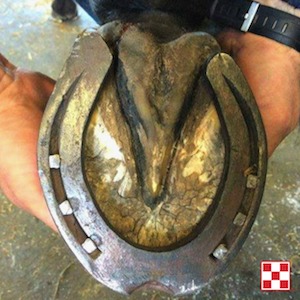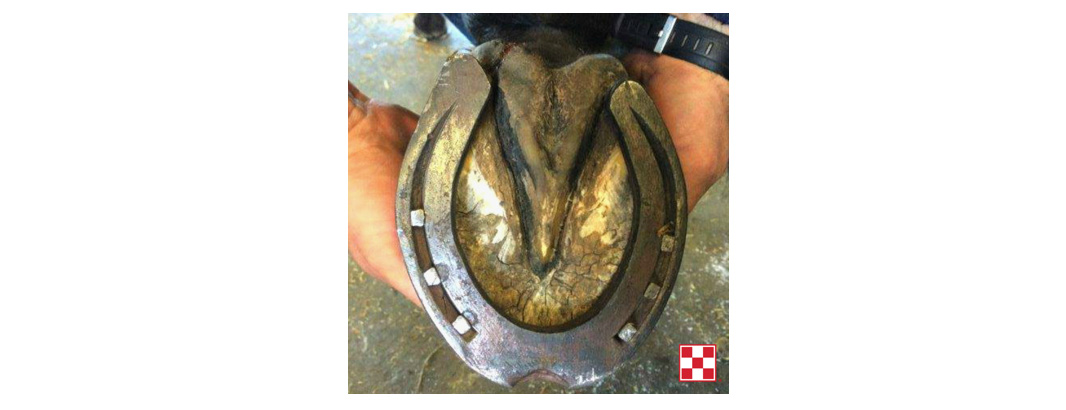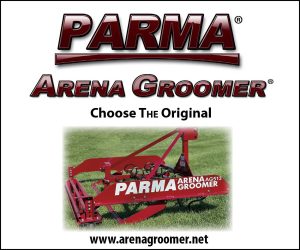Balance is Key
by Purina Animal Nutrition

The need for balance seems to arise in every aspect of horse riding and ownership. Your trainer pushes for a balanced ride. Your farrier trims and shoes for a balanced hoof. And, perhaps most importantly, you aim to provide your horse the right balance of forage and feed. But how much do you know about the balance between nutrition and your horse’s hoof health?
“Hoof quality is determined by several factors including genetics, environment, and nutrition,” says Karen Davison, Ph.D., equine nutritionist at Purina Animal Nutrition. “Some horses inherit weak hooves, and that can’t be changed. But proper care and nutrition can help a horse develop and maintain the best hooves genetically possible.”
The reverse is true too: improper care and inadequate or unbalanced nutrition can lead to hoof problems in a horse with the genes for great hooves.
Elements of Nutrition
Several nutrients can influence hoof growth and quality. A well-balanced diet will contain the nutritional elements needed for optimal hoof growth, but each horse is unique and different life stages, performance levels, and lifestyles can affect hoof quality. Here are some key nutrients and their impacts on hoof health.
- Protein:The hoof structure is primarily made of keratin, a protein. Proteins are made of amino acids and are necessary for healthy hooves and growth. Methionine, an essential amino acid, is thought to be important for hoof quality. However, balance is key; if fed in excess, methionine is also believed to cause a depletion of iron, copper and zinc. This can lead to crumbling horn and white line disease.
- Fat:A diet with adequate levels of fat can be beneficial to the hoof. Fats create a permeability barrier helping to prevent bacteria and fungi from entering the hoof horn.
- Zinc: Zinc is necessary for normal keratinization of the hoof. A study by Harrington, Walsh, and White in 1973 showed horses with insufficient hoof horn strength had less zinc in the hoof horn than horses with healthy, undamaged horns.
- Calcium and phosphorous:Calcium is essential for proper cell attachment in the hoof horn and wall. The right ratio of calcium and phosphorous is required, though, because excess phosphorous can block the absorption of calcium, leading to weak and abnormal bones.
- Selenium and Vitamin E: Selenium and vitamin E are important antioxidants protecting cell membranes. However, the balance of intake is crucial because selenium toxicity can cause hair loss, coronitis and coronary band bleeding, as well as sloughing of the hoof and laminitis. Note: Selenium levels in forage and soil vary by region. Talk to your vet or nutritionist about the proper amount of selenium for your horse.
- Biotin: Perhaps the most-researched vitamin for hoof growth, biotin is thought to help with hoof integrity, coat, mane and tail growth. Studies have reported varying effects, but horses with poor hoof quality despite a balanced diet and favorable environment might benefit from a therapeutic dose of biotin. Research indicates a therapeutic dose of biotin to be 15 to 20 milligrams per day.
“For the majority of horses, a diet with naturally occurring biotin, a suitable amino acid and fatty acid balance, as well as proper vitamin and mineral fortification will support excellent hoof growth rates and quality,” says Davison.
Certified Journeyman Farrier Donnie Perkinson with the American Farriers Association agrees. “The foot reflects everything about the horse, and nutrition is a paramount aspect of the overall health of the horse.”
Keep Learning
Every horse is different, and their nutritional and hoof requirements are significantly varied. Keep an open dialogue with your farrier, vet and nutritionist and seek opportunities to learn more about how feed affects your horse’s health and wellbeing.
The American Farrier’s Association, in partnership with Purina Animal Nutrition, is offering free clinics to AFA members. Clinics will include hoof care-related topics for farriers, veterinarians, and horse owners. For a schedule of events and to find a clinic in your area, visit www.americanfarriers.org/events. For more information on Purina® Horse Feeds, visit purinamills.com/horse-feed.
American Farrier’s Association is the oldest and largest U.S. based membership organization for farriers, and the only U.S. farrier association to have an internationally recognized certification program. To learn more visit www.americanfarriers.org.
Purina Animal Nutrition LLC (www.purinamills.com) is a national organization serving producers, animal owners and their families through more than 4,700 local cooperatives, independent dealers and other large retailers throughout the United States. Driven to unlock the greatest potential in every animal, the company is an industry-leading innovator. Headquartered in Shoreview, Minnesota, Purina Animal Nutrition is a wholly owned subsidiary of Land O’Lakes, Inc.
Originally Published February 2017 Issue
Purina Animal Nutrition LLC (www.purinamills.com) is a national organization serving producers, animal owners and their families through more than 4,700 local cooperatives, independent dealers and other large retailers throughout the United States. Driven by an uncompromising commitment to animal excellence, Purina Animal Nutrition is an industry-leading innovator offering a valued portfolio of complete feeds, supplements, premixes, ingredients and specialty technologies for the livestock and lifestyle animal markets. Headquartered in Shoreview, Minn., Purina Animal Nutrition LLC is a wholly owned subsidiary of Land O’Lakes, Inc.





